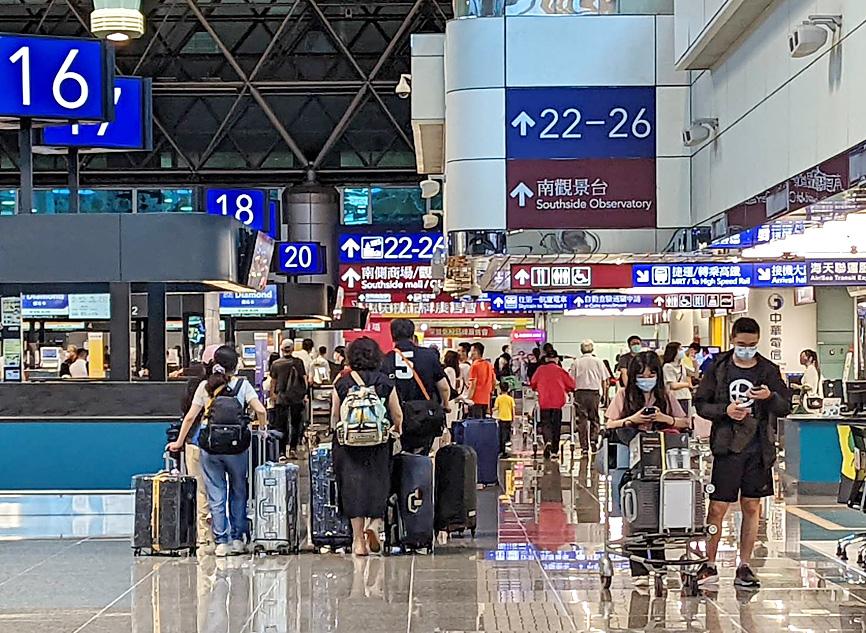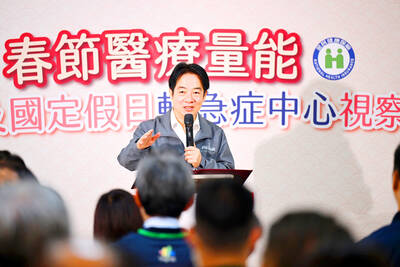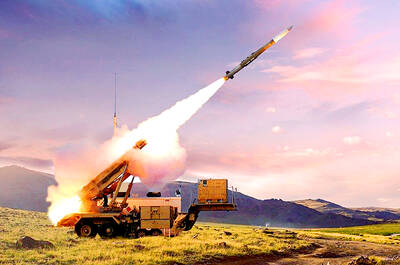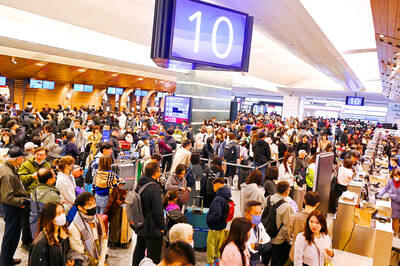The COVID-19-related border control measures and the cap on the number of international arrivals are not being eased, the Central Epidemic Command Center (CECC) said yesterday as it reported 112 imported cases of the Omicron subvariants BA.4 and BA.5 of SARS-CoV-2.
Centers for Disease Control (CDC) Deputy Director-General Chuang Jen-hsiang (莊人祥), who is CECC spokesperson, said a meeting was held yesterday morning in which the Cabinet decided that current border control measures would remain in place.
He said the main considerations were global COVID-19 cases increasing 21 percent last week, imported cases of Omicron subvariants BA.4 and BA.5 continuing to be detected and passenger flow being expected to increase during the summer, so the international passenger arrival cap would remain at 25,000 people per week.

Photo courtesy of Taiwan Taoyuan International Airport
The CECC would continue to monitor the number of domestic infections and severe cases, as well as healthcare capacity, when conducting reviews of border control measures, he said.
The “3+4” quarantine policy — three days of home quarantine, followed by four days of self-disease prevention — that all inbound travelers have to follow, which was implemented on June 15, would also continue, Chuang said.
Most neighboring nations had waited until their number of new cases fell from the peak to a lower level before loosening their quarantine measures, but Taiwan already loosened its measures on June 15, when daily local caseloads were still relatively high, so the center would need to observe the impact for a little longer before deciding if the quarantine rules can be dropped, he said.
The Chinese Nationalist Party (KMT) yesterday urged the CECC to exclude Taiwanese from the 25,000 people per week passenger arrivals cap, citing many overseas Taiwanese who would lose their right to vote in elections in November if they could not return to Taiwan before July 26 and complete their household registration.
Chuang said that maintaining the passenger arrivals cap is not motivated by electoral considerations and that only about 23,000 Taiwanese returned between June 1 and June 14, when there was no passenger arrivals cap.
After the cap was imposed, about 41,000 Taiwanese returned between June 15 and Saturday, he said.
CDC Deputy Director-General Philip Lo (羅一鈞), deputy head of the CECC’s medical response division, said genome sequencing of the virus samples collected from 182 imported cases, who arrived between June 9 and June 26, found that 112 were infected with the BA.4 or BA.5 subvariants of Omicron, or 61.5 percent.
Among the 112 cases, 95 were infected with BA.5 and 17 with BA.4, and so far a total of 238 cases — 202 cases of BA.5 and 36 cases of BA.4 — have been detected in Taiwan, Lo said.
Genome sequencing of virus samples from 476 domestic cases since May 1 showed that none of them were infected with BA.4 or BA.5, so the two new subvariants have not yet been detected spreading in local communities, he said.
However, the number of cases are increasing in Singapore and Japan due to local spread of BA.5, so the center advised people to wear a mask and frequently wash their hands when visiting other nations.
The CECC yesterday reported 23,045 new domestic COVID-19 infections, 73 imported cases and 69 deaths.
Lo said a one-year-old girl, who had encephalitis and pneumonia after infection, died of encephalitis four days after being diagnosed with COVID-19, adding that so far 21 children had died of severe illness, including seven with encephalitis.

NON-NEGOTIABLE: The US president’s action ran counter to one of the US’ ‘six assurances’ on not consulting China about arms sales to Taiwan, US lawmakers said US President Donald Trump’s admission that he is discussing arms sales to Taiwan with Chinese President Xi Jinping (習近平) is “alarming and a blatant violation of US policy and the six assurances,” US Representative Ro Khanna said on Tuesday. Trump on Monday said he would decide soon on whether to send more weapons to Taiwan, after Xi warned him not to do so. “I’m talking to him about it. We had a good conversation, and we’ll make a determination pretty soon,” Trump told reporters aboard Air Force One when asked about warnings raised by Beijing during a phone call with Xi over

REAL EMERGENCIES: To avoid overcrowding, the health minister urged people with mild or moderate symptoms to go to UCCs, while the ER should be for critical cases President William Lai (賴清德) yesterday inspected the nation’s Lunar New Year medical preparedness with a visit to an urgent care center (UCC) in Taipei and expressed confidence in the Ministry of Health and Welfare’s plans to prevent emergency room (ER) overcrowding during the nine-day holiday. The ministry in November last year launched a pilot UCC program to provide urgent medical care at 13 clinics in the nation’s six special municipalities over weekends and on holidays, aimed at relieving pressure on crowded ERs. To ease ER overcrowding during the Lunar New Year, when most hospitals and primary care clinics are closed, the National

VACILLATING? Some US officials are concerned that Trump’s April visit to Beijing might be affected if Washington pushes through additional weapons sales to Taiwan A major US arms sales package for Taiwan is in limbo following pressure from Chinese President Xi Jinping (習近平) and concerns among some US officials that greenlighting the deal would derail US President Donald Trump’s upcoming visit to Bejing, the Wall Street Journal (WSJ) reported on Wednesday. Trump on Monday said that he would decide soon on whether to send more weapons to Taiwan, after Xi warned him not to do so. “I’m talking to him about it. We had a good conversation, and we’ll make a determination pretty soon,” Trump told reporters aboard Air Force One when asked about warnings raised

HOLIDAY RUSH: Airport passenger volume is expected to reach a new high, while southbound road traffic would likely peak from Tuesday As Lunar New Year travelers flock overseas, passenger traffic at Taiwan Taoyuan International Airport is expected to shatter records, as Taoyuan International Airport Corp (TIAC, 桃園國際機場), Taiwan’s largest aviation hub operator, projected yesterday’s passenger volume to climb to 167,000. The figure comes after a record single-day high of 161,000 passengers on Thursday, and would surpass the previous pre-COVID-19 pandemic Lunar New Year peak of 166,000 passengers in 2019, TIAC said. Long lines could be seen forming as early as 7am yesterday, filling Terminal 1 of the airport almost to capacity, yet security checks took only 10 to 15 minutes. TIAC urged